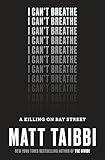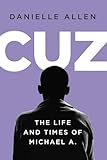
So often, black victims of the criminal justice system are fast moving statistics, hashtags, or headlines that fade in and out of view, instead of fully-formed humans we come to understand as failed by our many systems. A combination of new books—I Can’t Breathe: A Killing on Bay Street by Rolling Stone contributor and New York Times bestselling author Matt Taibbi; Cuz: The Life and Times of Michael A. by Harvard University professor Danielle Allen; and Don’t Call Us Dead by Danez Smith—works in ways overt and subtle to correct this damaging oversight. Individually, they own an aspect of the journey of one who has been killed: Taibbi writes an empathetic, journalistic overview; Allen writes with the intimacy of a loved one; and Smith transforms anticipated elegy into a defiant, lovely celebration.
 In I Can’t Breathe, Taibbi offers the closest thing to a comprehensive, mature look back at a single example of how these stories play out that I’ve read. It is a clear-sighted account of exactly how the criminal justice system renders invisible the bodies of black victims and their families, as told through the life and death of Eric Garner. Garner was killed by New York City police officer Daniel Pantaleo in July 2014, when Pantaleo placed Garner in a fatal chokehold for illegally selling loose cigarettes in Staten Island. The book is written in Taibbi’s vivid, precise language, like a literary version of the HBO show The Night Of. No life or pattern is left unexamined in the mosaic of problems that led to the end of Garner’s life, including the history of “Broken Windows” policing in New York, a pattern of unjustified and often fatal violence against black men throughout the city at the hands of police that crushes them in a bureaucratic criminal justice system. We know, because we live in America in the 21st century, that this is true for so many others.
In I Can’t Breathe, Taibbi offers the closest thing to a comprehensive, mature look back at a single example of how these stories play out that I’ve read. It is a clear-sighted account of exactly how the criminal justice system renders invisible the bodies of black victims and their families, as told through the life and death of Eric Garner. Garner was killed by New York City police officer Daniel Pantaleo in July 2014, when Pantaleo placed Garner in a fatal chokehold for illegally selling loose cigarettes in Staten Island. The book is written in Taibbi’s vivid, precise language, like a literary version of the HBO show The Night Of. No life or pattern is left unexamined in the mosaic of problems that led to the end of Garner’s life, including the history of “Broken Windows” policing in New York, a pattern of unjustified and often fatal violence against black men throughout the city at the hands of police that crushes them in a bureaucratic criminal justice system. We know, because we live in America in the 21st century, that this is true for so many others.
Instead of simply being a symbol, Taibbi asserts that Garner “was a flesh-and-blood person—interesting, imperfect, funny, ambitious, and alive—who just happened to stumble into the thresher of America’s reactionary racist insanity at exactly the wrong time. But his story—about how ethnic resentments can be manipulated politically to leave us vulnerable to the lawless violence of our own government—is not his alone. His bad luck has now become ours.”
 Danielle Allen’s Cuz is a both a close and distant look at the life of her cousin, Michael, for whom she was a primary financial and emotional support. Michael was devoured by the prison industrial complex by the Three Strikes law right after its inception in California. He spent the entirety of his formative years incarcerated. He fell in love with an inmate, Bree, and that love led to his death at 29. Cuz draws us close to Michael—his heart, his brain, his pride. It is not human to be caged, her book reminds us on every page. But prison not only impacts the prisoner, but everyone around him. They can never leave, nor can those who love them.
Danielle Allen’s Cuz is a both a close and distant look at the life of her cousin, Michael, for whom she was a primary financial and emotional support. Michael was devoured by the prison industrial complex by the Three Strikes law right after its inception in California. He spent the entirety of his formative years incarcerated. He fell in love with an inmate, Bree, and that love led to his death at 29. Cuz draws us close to Michael—his heart, his brain, his pride. It is not human to be caged, her book reminds us on every page. But prison not only impacts the prisoner, but everyone around him. They can never leave, nor can those who love them.
I wondered what the value would be, honestly, in Allen’s book. From a distance, learning the premise and her stature compared to her cousin’s, and reading The New Yorker excerpt, I wasn’t sure I trusted her as a narrator. In the end, I learned that her story is probably more common than not, just not unearthed as often—a concerned relative with more questions than answers.
 There is, though, hope in the midst of this mostly bleak aggregation of black mourning. While the facts and statistics about police brutality and violence and black mortality and incarceration in America are all damning and depressing as hell, what is also true is that black people do not abide a perpetual mournfulness. This is why we hold homegoing services, better known to most as funerals. You can bury us, but, as Danez Smith’s incredible poetry collection asserts, don’t call us dead. Smith has written an incredible array of meditations on what it means to survive. There are homages to some of the lost: Rekia Boyd and Trayvon Martin and Tamir Rice; addressing them with simple, rigorous, lovely lines like these in, “summer, somewhere”: “we say our own names when we pray./we go out for sweets & come back.” Or, “O, the imagination of a new reborn boy/but most of us settle on alive.”
There is, though, hope in the midst of this mostly bleak aggregation of black mourning. While the facts and statistics about police brutality and violence and black mortality and incarceration in America are all damning and depressing as hell, what is also true is that black people do not abide a perpetual mournfulness. This is why we hold homegoing services, better known to most as funerals. You can bury us, but, as Danez Smith’s incredible poetry collection asserts, don’t call us dead. Smith has written an incredible array of meditations on what it means to survive. There are homages to some of the lost: Rekia Boyd and Trayvon Martin and Tamir Rice; addressing them with simple, rigorous, lovely lines like these in, “summer, somewhere”: “we say our own names when we pray./we go out for sweets & come back.” Or, “O, the imagination of a new reborn boy/but most of us settle on alive.”
I do not want to cannibalize the gorgeous, whole, soaring loveliness that Smith has compiled here to well-deserved fanfare, on topics that certainly include a kind of healing resurrection for slain black people. The collection is also full of refreshing honesty and vulnerability about hooking up on dating apps and being HIV positive and the many betrayals of life that have nothing to do with other people, but can live right within the flesh, the bloodstream. What I loved most, though, about Smith’s poems, as with Taibbi’s book and Allen’s, is that they did not let numbers tell tales. Instead, they give us flesh and blood, beating hearts you’ll still be able to hear long after the books are closed. I can’t say it will be easy reading, but I can promise it will be worthwhile.
Image Credit: Wikimedia Commons.









